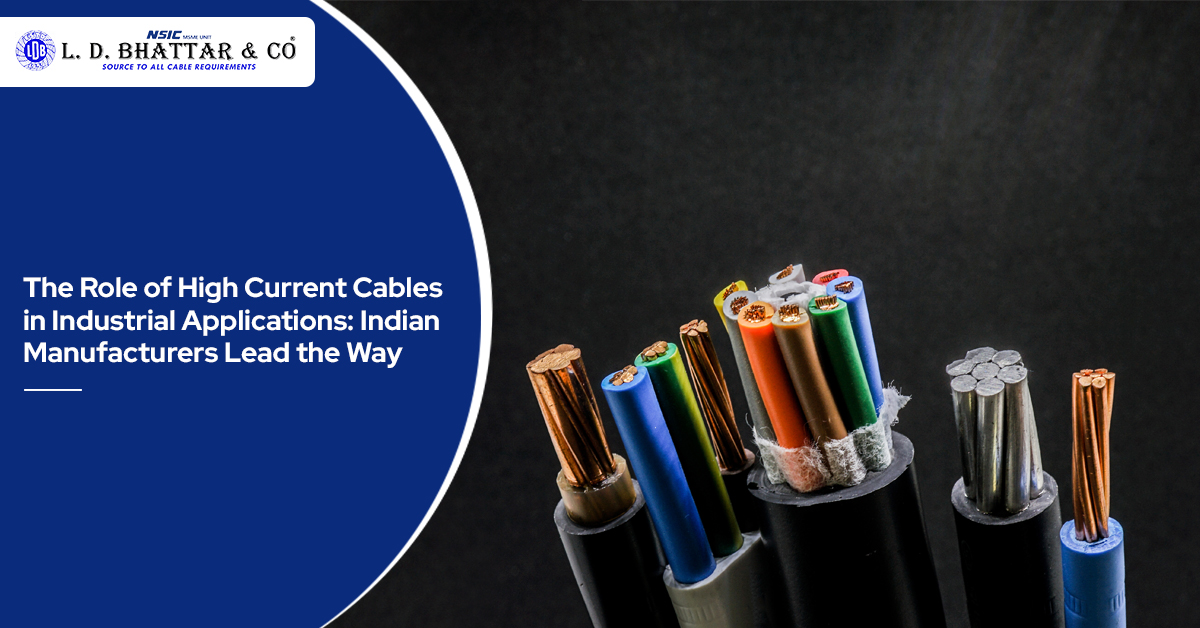The Role of High Current Cables in Industrial Applications: Indian Manufacturers Lead the Way

Industrial environments can be harsh on components and equipment. Designers often focus on sourcing rugged components and electronic systems, but they may overlook the importance of choosing the right cabling and wiring. Two cables that look similar can perform very differently in tough industrial conditions.
In this article, we will discuss the consequences of poor cable choices. It will explain what makes a cable suitable for industrial applications. And the reasons you should buy products from the high current cable manufacturers in India.
Why Should You Choose the Right Cable for Industrial Applications?
Choosing the wrong cabling may seem fine initially, but it can cause signal degradation and power loss from the start. Over time, it can lead to intermittent connection failures, which are hard to troubleshoot and can cause costly system downtime, especially in high-vibration environments.
Inadequate outer jacket material can expose wiring to chemicals, extreme temperatures, and physical abuse. As a result, these issues lead to short circuits and sparks. Industrial cables are more robust and use higher-quality materials than commercial cables designed for home use.
They can withstand heat, solvents, and liquids better and tolerate bending, twisting, and stretching forces. When selecting a high-quality industrial-grade cable, it’s important to purchase it from high current cable manufacturers in India.
What are the Features of High Speed Cables?
When purchasing high-speed cable assemblies, you must consider these basic points:
Design
High-speed cables are usually made in a flat ribbon design, allowing tight bends and multiple folds. This design saves space in cramped areas.
Pitch
These cables can have different pitches, ranging from 0.50 mm to 2.54 mm, enabling the attachment of multiple connectors.
Connectors
High-speed cables can have male or female connectors. They can also include signal and power connectors, as well as metric power headers and sockets.
Signal and Power
These cables feature strong shielding to minimise data or electrical power loss, improving transmission performance. Shielding also prevents noise in power applications and ensures signal integrity in sensitive applications. That’s why it’s recommended to buy wires from high current cable manufacturers in India to make the most of your money.
Factors to consider while purchasing products from high current cable manufacturers in India
Mechanical Durability
The strength of a wire assembly depends on its size and protective layers. The gauge of an industrial cable refers to its thickness. Customers today prefer smaller designs, making cable performance harder to manage. Avoid materials like PVC, thermoplastic rubber (for cut-through resistance), and paper (for filler).
Flexibility
Flexibility needs depend on the cable’s use. Flexible cables fit in tighter spaces, are less likely to snap, and are easier to use. Consider the flexibility requirements of your equipment, as not all connections need to be flexible.
Electrical Performance
In normal conditions, a cable’s electrical performance is influenced by its length and shielding. Thicker cables generally have lower resistance and can handle higher electrical loads over longer distances. Choose a gauge that safely carries the current without overheating or losing voltage.
Longer cables can experience signal loss, so avoid excessively long cables unless necessary. Include some slack for potential future changes. Shielding minimises electromagnetic interference (EMI), preserving the cable’s ability to carry current and reducing signal degradation.
Corrosion Resistance
Cables in industrial environments face corrosion from moisture, chemicals, oil, and UV light. To ensure corrosion resistance, consider the type and concentration of corrosives, exposure duration, and appropriate coatings.
Get in Touch with Us!
Keep in mind that proper selection while purchasing products from high current cable manufacturers in India prevents significant problems in the near future. When it comes to quality, industrial cables are top-notch compared to commercial cables and have higher longevity and signal quality. If you want to use such high-quality material for your business, contact L. D. Bhattar & Co
